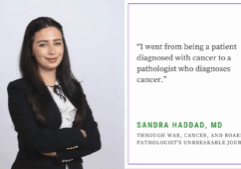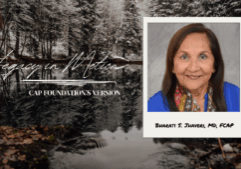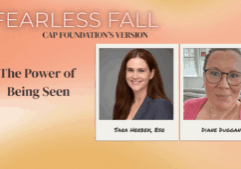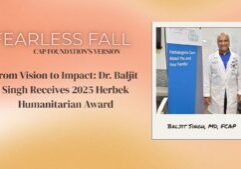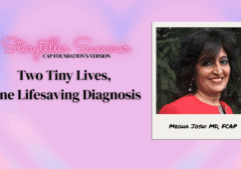Dr. Rebecca Osgood Exemplifies Pathology Leadership

Rebecca Osgood, MD, FCAP, has devoted her career to improving patient care through her work as a pathologist, volunteer, and community worker.
As a pathologist, Dr. Osgood has worked with the Cambridge Health Alliance for 27 years. The regional safety net health system is committed to providing high-quality care to diverse and low-income populations in the Boston area.
Before she hosted her first program in 2018, Dr. Osgood followed the story of See, Test & Treat through the CAP’s publications, but she was truly inspired to lead her own program after attending a CAP annual meeting spotlight presentation featuring See, Test & Treat’s founder, the late Gene Herbek, MD, FCAP.
“It was so moving, and the aim of the program matched with our hospital mission,” Dr. Osgood said. After returning from the CAP meeting, she immediately made plans to speak with her institution’s administration about applying to host a See, Test & Treat program.
“I really enjoy helping people, and I felt this program would help so many patients by giving them access to excellent care. It would also give many clinical and laboratory teams at our organization the opportunity to bond together for one goal: deliver free breast and cervical cancer screening with same day results,” Dr. Osgood said.
“This was a powerful event for all and speaks to why our staff went into health care—to help these underserved patients.”
Dr. Osgood’s team has held three See, Test & Treat events that have collectively provided over 150 women with breast cancer and cervical cancer screenings, as well as a variety of other vital services, such as flu shots and patient navigation services.
One of the challenges programs often face in serving a diverse population is how to ensure cultural appropriateness and inclusiveness so that community members who are less likely to get screened for breast and cervical cancer feel welcome at the program and have a positive experience.
Under her leadership, Dr. Osgood’s team has taken steps to bolster cultural appropriateness by enlisting Cambridge Health Alliance’s community health workers, who are trusted individuals that often live in the same area as the people they serve, to conduct outreach and education around the surrounding immigrant communities and the organizations that serve them. As a result, potential patients and community members felt included and more comfortable attending an event such as See, Test & Treat.
To further inclusivity for See, Test & Treat in Cambridge, Dr. Osgood ensured that all materials had inclusive language and encouraged all See, Test & Treat providers and volunteers to participate in sexual orientation and gender identity training to better understand the health needs of this community and optimize interactions with all patients. Furthermore, low English proficiency patients were paired with volunteers who spoke their language, helping to bridge the gap between care and the community, patient and provider.
“Cambridge Health Alliance’s large, low-income, diverse patient population exhibits many well-
documented barriers to cancer care, such as language, lack of childcare, transportation difficulties, and getting time off from work,” Dr. Osgood said. “I wanted to use the See, Test & Treat program to address some of these issues.”
As a result of these efforts and the welcoming, organized environment orchestrated by Dr. Osgood and her team, patients felt more comfortable with going to the doctor and indicated that they were more likely to seek out preventative services due to attending this program.
In 2020, Dr. Osgood took on the role of the CAP Foundation’s Communities of Practice Chair, where she worked with CAP Foundation staff to improve information sharing between See, Test & Treat host sites with the goal of improving the program’s long-term impact.
When it became apparent that the COVID-19 pandemic would be impacting the health care system long-term, Dr. Osgood led discussions with See, Test & Treat host sites across the country to determine how See, Test & Treat can be implemented safely. Due in part to these discussions, eight See, Test & Treat host institutions were able to successfully hold their programs and deliver free breast and cervical cancer screenings to almost 450 patients safely and effectively, despite the pandemic.
“Cancer does not wait for COVID,” Dr. Osgood said. “I think the biggest impact of See, Test & Treat in 2020 was the ability to give access to this critical cancer screening testing even during the middle of a national pandemic.”
Dr. Osgood truly emulates the mission and vision of the CAP Foundation and has been integral in not only delivering care to medically underserved communities around Boston, but to the larger See, Test & Treat program. She leads by example, fostering the next generation of pathology leaders, motivating her volunteer clinician team, and providing quality patient care to undeserved communities.
More Stories
Why Donate
Every person deserves a diagnosis. Support care beyond the microscope. Expand access to pathology-locally and globally.

